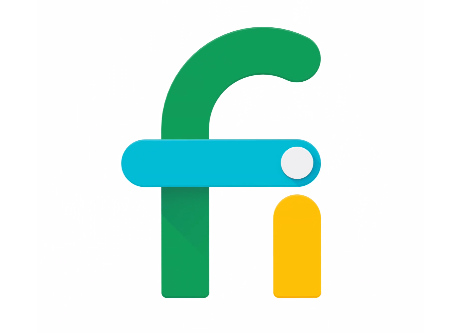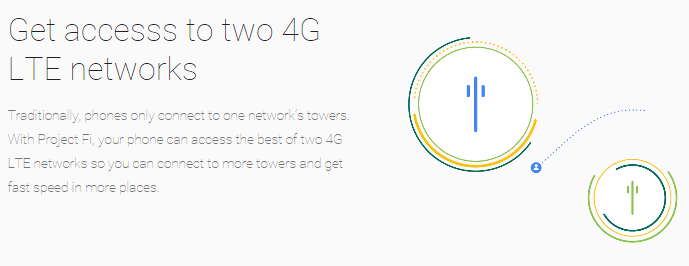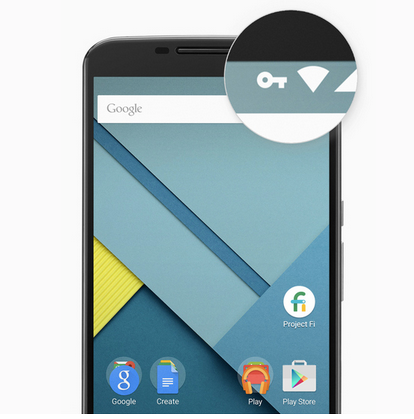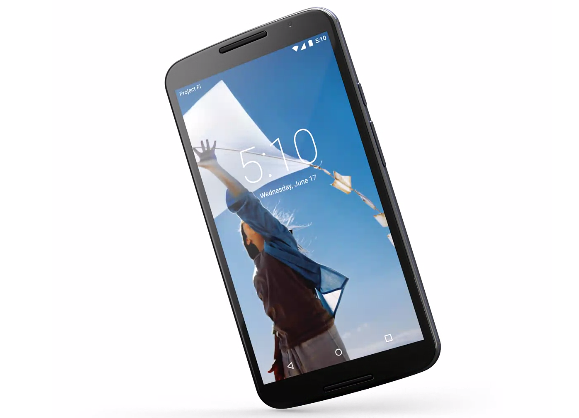Google Becomes An MVNO With Project Fi, Offers Rollover Data, Free Tethering
Today, Google announced its much anticipated "Project Fi" wireless service that can seamlessly connect Wi-Fi and LTE networks with each other and where you pay for only as much data as you use. The service will connect to both T-mobile and Sprint networks and will switch between them depending on which is stronger in your area. It will also automatically connect with over one million open Wi-Fi hotspots that Google has checked for strong signal.
The main selling point for Project Fi is that unused data will be converted to dollar credit for the next month. Right now, the way the major carriers charge is by setting a fixed amount of data for a fixed amount of money, but even if you end up using only a third of that data, you'll still pay the same. With Project Fi, no unused data is wasted.
The pricing structure is as follows: First, you have to pay $20 for the "Fi Basics" package, which includes:
Unlimited domestic talk and textUnlimited international textsLow-cost international callsWi-Fi tetheringCoverage in 120+ countries
Then, for every gigabyte of data you pay $10; thus, it's $10 for 1 GB, $20 for 2 GB, and so on. Keep in mind that unused data is rolled over to the next month.
Another selling point of Project Fi is that the service will connect to the strongest signal, whether that's T-Mobile's LTE network, Sprint's LTE network or the one million open Wi-Fi hotspots. This should improve call quality for Sprint customers where, for example, the signal is not as strong as T-Mobile's in a given area (or vice versa).
It should also improve the bandwidth for data connections. When the two carriers' networks speeds aren't fast enough, a local Wi-Fi hotspot may be the better choice.
Get Tom's Hardware's best news and in-depth reviews, straight to your inbox.
Open Wi-Fi hotspots can be used to siphon sensitive data from users who log into websites that aren't encrypted. Fortunately, Google will encrypt all open Wi-Fi connections with a "private tunnel," which is just another way of saying "VPN." This is a service Google has been rumored to offer with the launch of Project Fi.
Another feature that Google offers with Project Fi, and should be offered by all carriers (but isn't), is free tethering from your device. You can use your smartphone as a Wi-Fi hotspot for other devices, such as your laptop. Google will still charge for all consumed data, but it won't charge extra just for the privilege of using the phone's Wi-Fi hotspot feature.
Unlike with data plans from other carriers, there's no annual commitment to Project Wi-Fi. You can leave whenever you want, and there is no termination fee.
As tempting as Project Fi may sound, there are currently some serious limitations. The biggest is that the service only works on the Nexus 6 at present. It's the only device that comes with a special SIM that can connect to multiple networks at the same time, as well a "state-of-the-art" radio chip that can work with different network types.
Considering that Project Fi only works with Google's latest Nexus phone, it seems the company has chosen the wrong time to launch such an expensive device with the Nexus 6, which starts at $649 unlocked. Older Nexus devices cost closer to $350, which would be a more palatable sticker price for many users.
If you are one of the lucky few who owns a Nexus 6 and lives in the U.S., you can sign up for Google's Project Fi by requesting an invitation.
Follow us @tomshardware, on Facebook and on Google+.
Lucian Armasu is a Contributing Writer for Tom's Hardware US. He covers software news and the issues surrounding privacy and security.
-
jimmysmitty While they say they will encrypt any open WiFi connections, I am sure they will find a way to utilize your data like always.Reply
As well I never connect my personal phone to an open WiFi hotspot. Even if they encrypt it the hotspot itself might present holes that encryption cannot make up for.
The one good side I see to it though is that it might help push the bigger carriers and give us better rate plans in the future. -
hottorch451 You didn't even bother to read the press release. Your unused data is not rolled over as you state. Directly from Google "you'll get credit for the full value of your unused data".Reply -
eklipz330 ReplyYou didn't even bother to read the press release. Your unused data is not rolled over as you state. Directly from Google "you'll get credit for the full value of your unused data".
First sentence of the second paragraph:
"The main selling point for Project Fi is that unused data will be converted to dollar credit for the next month." -
firefoxx04 If connecting to an unsecured wifi hotspot has you worried, maybe you should be using a VPN? I host my own VPN for my personnel needs. Works pretty well and minimally impacts my latency and user experience for web browsing, even with junk comcast 25down 5 up.Reply
I can also use my VPN to connect to any of my home computers without fancy port forwarding for each computer. Just connect to the VPN, jump on remote desktop and done. -
hottorch451 @eklipz330 Since you didn't read the article I was referring to the fourth paragraph second sentence that states "Keep in mind that unused data is rolled over to the next month."Reply -
rgd1101 ReplySo you're paying $10/GB for your WiFi data now? That's a big "improvement".
https://fi.google.com/about
https://fi.google.com/about/faq/#plan-and-pricing-5
No you are not charged for the data you use when connected to open or home Wi-Fi. We only charge $10 per GB for the cellular data you use. -
Achoo22 So, $100/mo unlimited 1 Gb/s connections for people in metro. areas and $10 / Gb for everyone else? Screw you, Google!Reply -
Imon750 In my country I use (equivalent of) 2$/GB with speed of 21.1 Mbps (good enough for cellular). No thanks, Google. I don't even use 10$ in data per month. Only 8$Reply -
Rattenmann This really sounds expensive. Even if i only use 1 gb per month, that is still 10 bucks.Reply
There are better plans in my country. Like 2gb data, unlimited phone / text for 5,99.
Will i get credit for unused data? No. But i still only pay 6 bucks, even if i use 2 gb.
And honestly, i don't know how i could use more then 1gb on my phone anyways. There are so many wifi spots that there is really no reason to download huge apps in the few odd hours.




